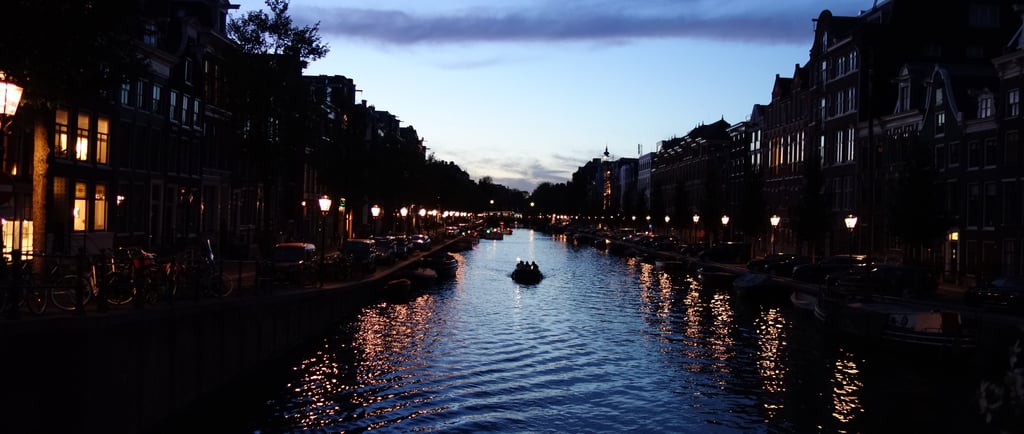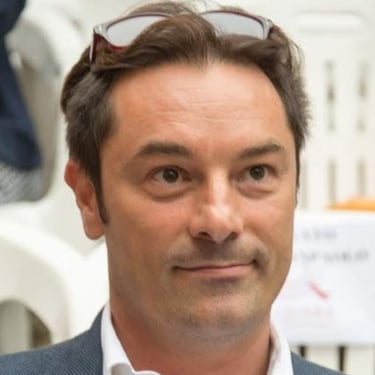STARRY NIGHT
ALM No. 82, November 2025
SHORT STORIES


Summer 1889, Saint-Rémy
Dawn is near. The candle flames behind the man flicker, stirred by a light breeze drifting in from the fields through the open window.
He is barefoot. His shirt, worn and stained with dried paint, hangs open over his narrow chest.
He holds a palette and brushes. In front of him, a canvas rests on an easel. His brushstrokes on the white fabric are short—sometimes slanted, sometimes curved, at times swirling—like his thoughts.
He is immersed in the darkness of a starry night.
There are too many restless thoughts in his head to express in words. So he paints them, along with rooftops, shrubs, trees, mountains. A large cypress tree—more like a shadow in flames than a plant. Above everything, a sky alive with swirling stars and wind. A crescent moon, drowning in deep blue.
He smiles.
A melancholic curl of the lips on a face framed by a reddish beard.
He remembers the time before he fell madly in love with art and nature—when he burned with religious mysticism. Back then, he called himself afflicted, yet always joyful.
Now, in this gray room of an asylum, he feels the same: suffering, but suddenly happy.
When he was in Nuenen, in the north, they called him a “canvas smudger.” It hurt. But here, in the cell of what once was a convent, alone before the infinite, he wonders what weight the judgment of others still holds.
Chasing the light, drawn by the Mediterranean tones, he had reached Arles.
In the south, he had found his place. He could hardly believe he lived in a yellow house. He painted it just like that, in one of his favorite colors—along with his room, the wheat fields swaying in the wind, and the sunflowers.
He painted furiously, every chance he could, en plein air—just like the Impressionist masters he admired. But unlike them, he didn’t aim to capture the light of a single moment.
He could be seen leaving early in the morning, carrying his easel, canvas, and colors, returning only at dusk. He shielded himself from the sun with a straw hat and from the rain with an umbrella—and kept painting.
He could capture what the eye usually misses. In his studio, cluttered with canvases, he would gaze for hours at a painted landscape. He could still feel the scent of wildflowers where he had spent the day, the sun’s heat burning his skin, the wind shaking the wheat—and sometimes his hat.
But all of that, however fleeting, belonged to the material world.
He wanted more. He chased a dream.
He yearned to paint sensations.
Upon those ears of wheat, those flowers, those fields, those faces—he laid the luminous hope of happiness, the serenity he had been chasing with stubborn devotion since boyhood, since he first began to draw and was already facing criticism—starting with his father’s.
His brother, on the other hand, understood him, supported him, loved him. And he always returned that love, with all he could give. He sent him paintings and letters.
Then the colors exploded in his head, blinding him and leaving a dark stain that terrified him—as if he had gone suddenly blind.
Anger. Pain. Sadness. Fear.
The feeling that brought him here.
Fear of disappointing the only person on earth who had ever believed in him without question.
For his brother’s sake—for fear of causing more worry—he chose to isolate himself here, far from everything. Alone, with his improbable colors.
Tonight, fear melted away in the urgency of facing a blank canvas and filling it with the colors he carries within.
The Pulse of Creation
By the open window, he begins once again to make love to his art, shaken by desire. He doesn’t feel jealous of it—he knows it belongs to him alone. Others do not understand it—or worse, are disturbed by it.
His way of painting is not for the people of his time—this, he has accepted. But those who come after, he’s certain, will recognize him.
Each time he holds a brush, he is reborn.
In spite of everything.
The urge that moves his hand is so intensely satisfying that he could go without food, without sleep.
To paint.
That is all he desires.
If he could choose the moment and manner of his death, he would want it to be with a brush in hand, in a field, outdoors.
Perhaps he could even paint it—death.
He might catch it in the wild flight of black crows rising from a wheat field before the storm hits, or when those ominous birds seem to be born from thick clouds darkening the sky.
His hand pauses in midair, disturbed by the image he glimpsed in the twisted labyrinth of his mind.
He blinks, trying to shake off an invisible weight.
As often happens, he tries to push those thoughts away. He is drawn to their allure, but recognizes their danger—like Ulysses and the sirens’ song.
He dips the brush into green and brown, blends them, and swiftly presses them onto the canvas, to the left, from top to bottom.
The two cypresses, shaken by the wind, are flames burning before his eyes, linking sky and earth.
He feels them tremble, smells their resin. He strokes them with fluid, sinuous gestures, masking the terror they evoke.
They are dark, heavy, swollen with the wind that precedes a storm.
They are guilt—perhaps remorse—or unspoken omens, enormous and vibrating, capable of eclipsing all else.
Or maybe they are portals—leading the soul to the stars, through death.
But he masters them and pushes them to the side.
A Living Night
His night is not still.
It flees constantly.
It’s charged with mystery and unrest.
He must capture it quickly, before it disappears.
Beyond the trees stretches the memory of his childhood village.
The glow of winter hearths warms his face.
His brushstrokes become tender, lighter. A soft blue outlines rooftops and the spire of a church—kneeling, bowed in prayer.
He touches yellow on the palette.
The man presses it onto the canvas, drawing scattered little windows.
Behind one of them, a mother cradles her child. A nightmare woke him suddenly.
In the silence, he hears a lullaby whispered by lips that kiss his eyelids, guiding him safely back to sleep.
He is not safe.
He never has been.
Hills wrapped in darkness and olive trees watch over the village—but he paints them as if they loomed, like the foaming waves of a stormy sea.
The breeze carries the endless chirping of crickets to his ears.
Under his bare feet, the grass—soft and damp with dew—tickles his skin.
He seeks blue on the palette, softens it into dozens of shades—from the darkest, densest hue to turquoise—and swirls the brush across the canvas.
Nothing in his sky is still.
Suddenly, he loads the bristles with the brightest yellow he has and lets it burst at the center of the sky—creating spinning stars, terribly, desperately beautiful.
The moon, traced in curved lines, expands.
Everything pulses, throbs, overflows with life—distorted by the tears that cloud the man’s eyes, thrilled and overwhelmed by the image taking shape in his hands. Still disbelieving that he managed to capture his sensations on the canvas.
He stares at it, barely breathing.
He takes a step back and tilts his head to see better.
The breeze grows stronger—turns into a warmer wind and blows out the candles with a sudden gust.
He inhales deeply.
Before him, the window widens—and the sky gleams with the same colors he painted.
He rises from the stone floor and begins to float upward—light as a dream.
He notices the brush still in his hand. As he nears a star, he tries to dip it in yellow, softens it into the zinc white around it, creating a shade of orange.
He drifts in the cobalt blue of the sky, laying down the color once more—thick as cream in some places, thinner in others, scraping until the void shows through.
He closes his eyes.
The scent of oils and solvents intoxicates him as much as the absinthe that once sweetly poisoned him in Paris.
When he opens them again, his feet are back on the room’s floor.
Before him, the painting he has just completed.
In that cobalt blue, the ultramarine, the Indian yellows and the zinc white, the man clearly sees his solitude, the disorientation, and the fragility that have stayed with him for so long.
Now, he believes he might be able to exorcise those demons.
He wipes his eyes with the back of his hand, leaving a smear of oil paint on his face.
This painting, too, he will send to his brother.
The gallery in Montmartre already overflows with his works.
He stands still, suspended—between dream and reality.
Tomorrow, he will paint again.
Unbothered by criticism, indifference, or mockery.
And he wishes tomorrow would come already.
“I observe in others that they too, during crises, hear strange voices and sounds like I do, and see things transformed. That eases the horror I used to feel about the crises I had […] I dare believe that once you know who you are, once you're aware of your condition and the possibility of having crises, you can do something to avoid being surprised by anguish and terror […] Those who have been here for many years, in my opinion, suffer from a complete collapse. My work will, in part, protect me from that danger.”
(Letter to Theo Van Gogh, May 25, 1889)
Angelo Basile was born in Milan in 1972. He has a classical education and works as an operating room nurse. Writing and sailing are his greatest passions. Since his literary debut in 2016, he has won numerous national and international awards, including Le Fenici, Giallo Garda, La Quara, and Loris Malaguzzi. His novels include Plenilunium (Oakmond, 2018), Lorenzo Malerba e la villa dei misteri (Oakmond, 2020), and Hamelin (Il Ciliegio, 2024). His stories have appeared in several anthologies and literary magazines in Italy and abroad, including OvunqueSiamo and a Brazilian anthology dedicated to Vincent Van Gogh.

